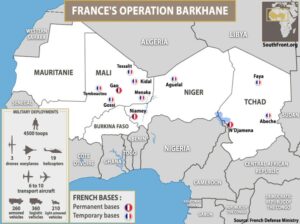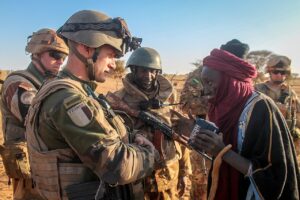Managing Mali mayhem key to countering terrorism

French troops have struggled to curb militants in Sahel even after years of battles (Photo: French Defence Ministry)
On Monday, leaders of the 15-member Economic Community of West African States (ECOWAS) decided to close borders with Mali and impose tough economic sanctions as the military junta in power since last year’s coup, second in under nine months, failed to hold the promised elections that have been delayed several times by the rulers in Bamako.
The developments in Mali and the response of its neighbours as well as the international community, seem to be replay of events that took place in 2020. On August 8, soldiers led by Colonel Assimi Goita staged a coup and overthrew President Ibrahim Boubacar Keita and Prime Minister Boubou Cissé and detained them.
The coup had come on the back of a two-month-long widespread unrest, with protestors seeking Keita’s ouster. The ECOWAS was quick to condemn the coup and demanded Keita’s reinstatement, closed borders with Mali and imposed sanctions on the country.
Goita promised to hold elections by February 2022 and paved way, a few months later, for an interim civilian government lead by President Bah Ndaw and PM Moctar Ouane, even though he as the military commander maintained overall control over the instable country in Sahel region of western Africa that has been facing insurgency for over a decade.
However, in May last year, Goita staged another coup and deposed the interim government and also arrested Ndaw and Ouane, alleging that they failed in their duty and the two were seeking to sabotage the country’s transition. They were arrested hours after a government reshuffle which saw two senior army officers replaced. However, at that stage Goita promised that elections would go ahead as scheduled February.
France ends Barkhane
The second coup was denounced by the international community, notably the former colonial power France and President Emmanuel Macron came down heavily on the coup leader. He also announced that France was ending its military campaign, Operation Barkhane, against alleged Islamic Jihadi militants that control vast swathes of land in the Sahel region, including big chunks of north-eastern Mali, which has been under their de-facto control for several years. France spent billions of euros and had despatched thousands of soldiers in bid to curb the militants in the entire region, including Niger, Chad and Mauritania, besides Mali, for almost a decade. Goita and his team criticized France for abandoning the key battle against terrorism and warned that the French withdrawal threatened to undo the gains made over the years of fighting the Islamist militants.
But all through he maintained that the elections would go ahead as scheduled in February, adding a caveat that it would be after a nationwide conference, saying that it would create a path for a peaceful vote, which was more important than a hurried poll.
The ECOWAS and France criticised it but continued to watch from the sidelines. After the conference on December 30, Goita’s officials suggested a new transition period, lasting anywhere between six months and five years, starting from the New Year. This set off another round of criticisms and disputes, following which the ECOWAS Summit was hurriedly organised in Ghanian capital Accra.
At the Summit, leaders of 14 nations, except Mali, decided to impose immediate economic sanctions on Mali to pressure Goita into holding elections next month. The sanctions included the closure of members’ land and air borders with Mali, the suspension of non-essential financial transactions, and the freezing of Malian state assets in ECOWAS commercial banks and by the central bank of the eight-nation West African CFA Franc zone. The countries also warned that the sanctions would remain in place until Mali accepted all conditions returned to Constitutional rule at the earliest. However, the junta criticised the sanctions as being illegal and also recalled Malian ambassadors to the West African nations involved and also closed land and air borders with them.
Big Game in Sahel: Next Afghanistan
While the ECOWAS meeting was on, thousands of km away in New York, the issue was also being discussed at an emergency meeting of the United Nations Security Council where differences emerged between the five permanent members of the council, indicating that the global powers were not only divided on the developments in Mali but also pointed at a big game being played by major powers in the Sahel desert.
At the Security Council French ambassador expressed his country’s full support for ECOWAS’ efforts, while the United States ambassador Richard Mills asked Bamako to return to democracy in a timely fashion, but refrained from commenting on the sanctions that it is still reviewing.
Another permanent member of the UNSC, Russia took a contrarian stance and called for the junta’s efforts to restore order in the country to be supported and added that it understood the difficulties in organising new elections when a lack of security might undermine the outcome.
The Malian junta accused the bloc of being exploited by extra-regional powers with ulterior motives, in a reference to France. The junta added that it deplored the inhuman nature of these measures which affect populations already severely affected by the security crisis and the health crisis. It added that it had already made arrangements to ensure normal supplies ‘‘by all appropriate means’’ and called on the population to remain calm, in perhaps another veiled reference to Russia.
Western politicians have condemned what they say is Moscow’s growing influence in Mali, some alleging that the military regime has hired mercenaries from Russia’s controversial Wagner group that allegedly supplies mercenaries around the world.
As tensions with United States and European Union grow over the situation in Ukraine, Belorussia and now in Kazakhstan, Russia is keen assert its position as a global power and not a spent force and it with this objective that it has been flexing muscles around the world, especially in its backyard as well as in Syria where it has single-handedly propped President Bashar al Assad despite concerted attempts by the West to topple him that led to a long and bloody civil war in the country.
Similarly, with France pulling out after a rather ineffective campaign against the insurgents in the Sahel region, it seems that Russia is rapidly stepping up its own presence, leading to worries in various EU capitals as well as in Washington DC.
Competition between western powers and Russia-China in Mali and broader Sahel region is the last thing the world needs. Though Afghanistan has fallen again in the hands of the Taliban, the epicentre of global terrorism is indeed the Sahel where dozens of groups have been operating and have managed to sustain and grow despite actions by France and the occasional intervention by the US.
To end the threat to themselves and the world, the big powers need to stop their game and move from competition to cooperation. Though it looks unlikely to come about in the current atmosphere of mounting distrust between Russia and the western world which is also engaged in another war of nerves with China. One can only hope that the global leaders will, for once, rise about their short-term, narrow goals and look at the greater good of the world.











